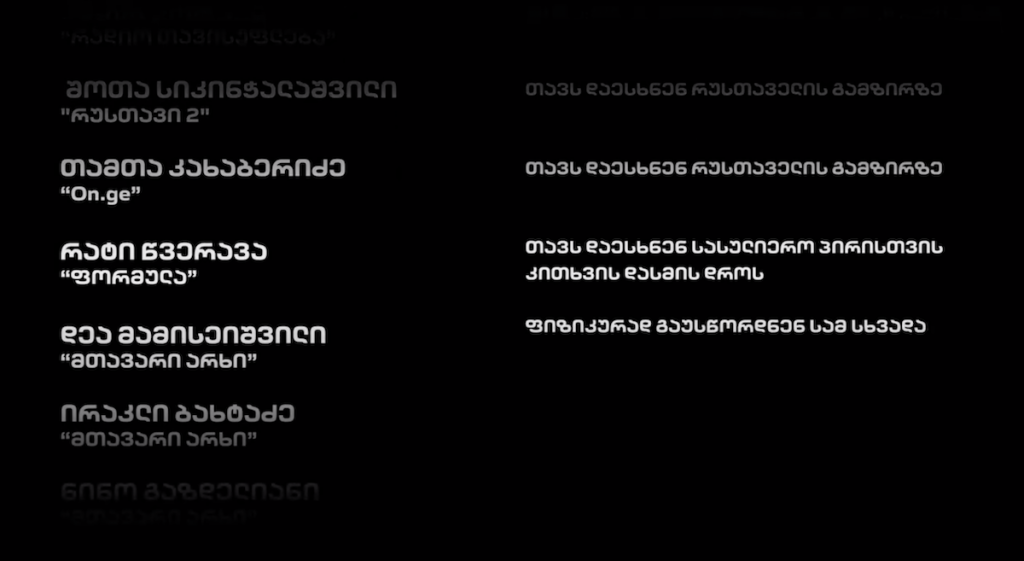Four Georgian TV companies stop broadcasting for a day, call Prime Minister to resign
“Irakli Garibashvili must resign! Punish all offenders!”, with this demand, four leading Georgian TV companies stopped broadcasting for 24 hours starting from July 14.
Today in Georgia, the screens of the leading TV companies – Pirveli, Mtavari, Formula and Kavkasia – went out.
The temporary suspension of broadcasting is part of a large-scale protest in Georgia led by journalists after the death of cameraman Lekso Lashkarava, who was severely beaten during the July 5 riots.
Since the morning on the blackened screens of four TV channels, there is only one message is shown – the names of the journalists who were injured during the July 5 events.

Regional TV companies also take part in the protest – they stopped broadcasting for ten minutes on July 13, exactly at 15:00 – during the funeral of Lekso Lashkarava.
-
The events of July 5 and the death of Lekso Lashkarav. Quick reference
On July 5, at 18.00 a Mach of Dignity was scheduled to take place in Tbilisi as part of the Tbilisi Pride Week.
The Patriarchate soon announced a counter-protest against this march, urging its supporters to take to the streets and defend the country from a “perverse way of life”.
On the morning of July 5, severl far-right groups marched outside the parliament building. First, they demolished the opposition tents, which had stood in front of the parliament building for months, and then attacked journalists who had been covering the events.
As a result of targeted attacks on media on July 5, 53 journalists were injured in Tbilisi.
The clergy openly pushed the assembled groups to violence. “You simply have to resort to violence for the sake of cleanliness”, said Archbishop Spiridon while addressing the crowd.
According to observers, the actions of the radicals were provoked by a statement by Prime Minister Garibashvili on 5 July in which he accused the organizers of the March of Dignity of a possible complication of the situation in the country and urged them not to march along Rustaveli Avenue. Garibashvili said the planned March of Dignity was “inappropriate” and dangerous. He also said that it was orchestrated by the opposition.
The March of Dignity was canceled, but the riots on Rustaveli Avenue continued for several more hours.
According to journalists, there were not enough police officers on the spot during the day. But the interior minister said that it mobilized as many security officials as possible.
According to media representatives, homophobes targeted them on purpose. Some of the journalists required surgery and serious medical intervention.
Among them was Lekso Lashkarava, an operator of the Pirveli TV channel. He and his colleague Miranda Bagaturia, also a journalist from TV Pirveli, were attacked in the office of the Shame Movement political organization. According to Bagaturia, Lashkarava was beaten by 20 people. According to eyewitnesses, there were also clergymen among the criminals.
Lashkarava was taken to the hospital with a fracture of his facial bones, he was operated on the same day and in three days he left the clinic. The day before his death, on July 10, he was a guest of the Pirveli TV daytime program, where he discussed the events of July 5.
On July 11, Lashkarava’s mother found him dead in his bed.
Family members say Lashkarava was bleeding from his nose. According to one of the versions of his relatives, as a result of his injuries, he died of thromboembolism.
The body of the young man was taken to the forensic experts without the consent of the family. The body of the man, wrapped in plastic, was taken out of the house without a stretcher and dragged to the car. Such treatment of the deceased became another reason for public dissatisfaction and a topic of discussion on social media.
The Ministry of Internal Affairs has launched an investigation into the incident under the article on incitement to suicide.
Soon after Lashkarava’s death, government-linked websites began spreading information that Lashkarava had been using drugs and could have died of an overdose.
In the evening of the same day, on July 11, the Ministry of Internal Affairs held a briefing at which the version of the “drunken state” of Lvshkarava was once again disseminated.
Journalists and civil society representatives do not believe the government’s version.


















